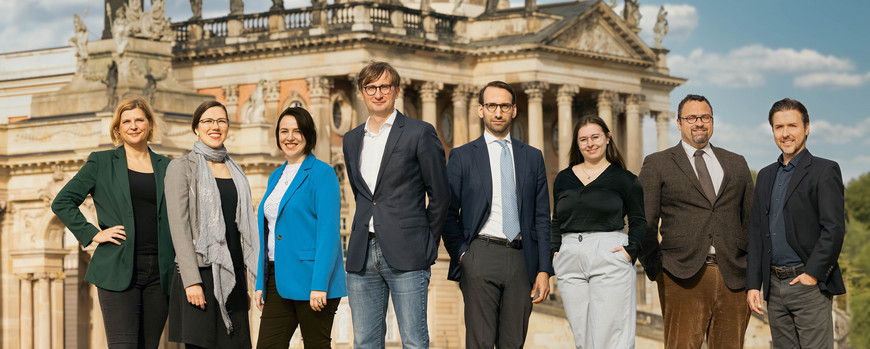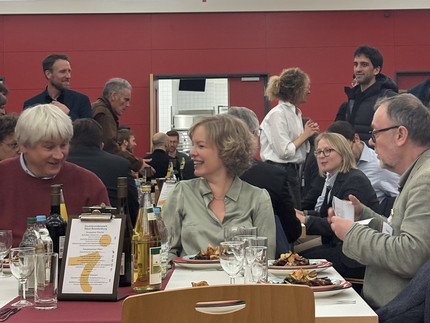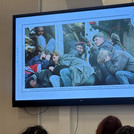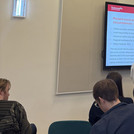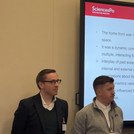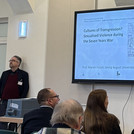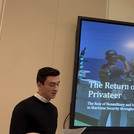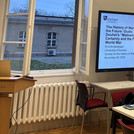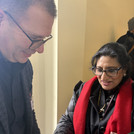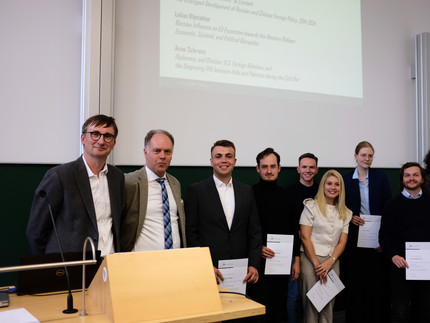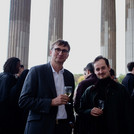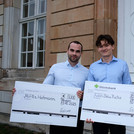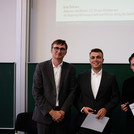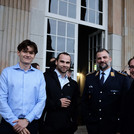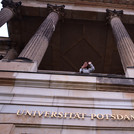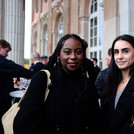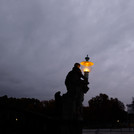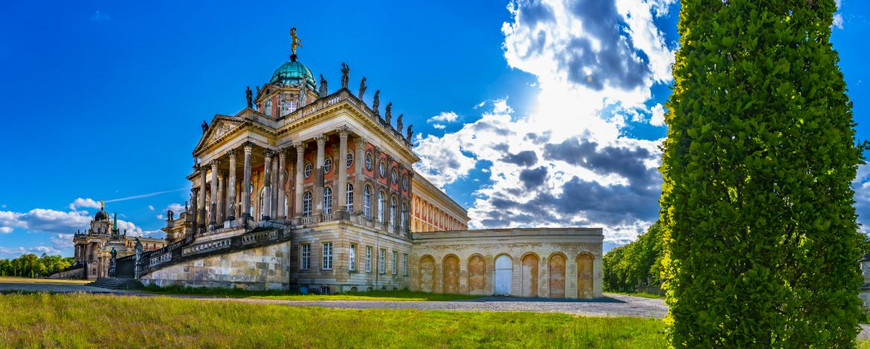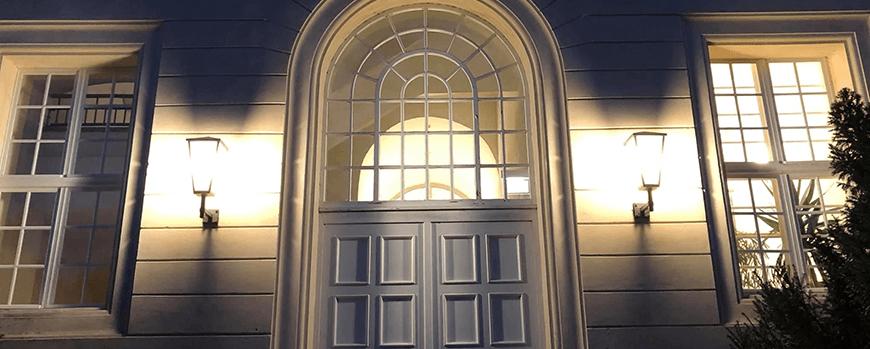Chair of War Studies
The chair as host for the SHOW Conference 2025
In November 2025, the Chair of War Studies, together with the Society of the History of War (SHOW) and the Center for Military History and Social Sciences of the German Armed Forces (ZMSBw), hosted the annual SHOW conference. This event was a special highlight in the Chair's annual program and was prepared with great care. From November 27 to 28, 2025, more than 170 participants from all over the world gathered in Potsdam for a professional exchange on the topic of “Cultures of War and Violence.” The Show promotes interdisciplinary dialogue on the history and conduct of wars in order to understand their profound impact on society, culture, and historical change. However, the event not only serves as a forum for sharing new research findings, but also promotes a global network of experts dedicated to addressing the ongoing challenges arising from the legacies of war and violence. The show's conferences have taken place in Amsterdam (2022), Lisbon (2023), Nicosia (2024), among other locations; this year, the University of Potsdam and the ZSMBW hosted the event. During the event, up to eight panels ran simultaneously. The keynote speech was given by Professor Beatrice de Graaf.
The event kicked off on November 27 at the ZSMBW. On the second day, participants gathered on the Am Neuen Palais campus.
On both days, dedicated students from the Chair of War Studies supported the event and helped ensure that everything ran smoothly.
The Association for Military History made a significant financial contribution to the event, without which, for example, the much-praised catering during the conference would not have been possible. Thank you very much! Combined with the equally excellent hospitality provided by the German Armed Forces, this contributed to the fact that the discussions in the panels could take place in an extremely productive atmosphere from early in the morning until late in the evening.
Participants commented positively on the hospitality of the University of Potsdam and the breadth of the panels on offer.
The conference dinner, with its fantastic three-course menu, was repeatedly mentioned as a highlight, rounding off the event. We would therefore like to express our sincere thanks also to the cafeteria at the New Palace.
Ceremonial start of the 2025 semester
This year's ceremonial start of the semester took place on 10 October 2025. The new cohorts in the MA War and Conflict Studies and MA International War Studies programmes were welcomed.
The students from the 2023/24 cohort were bid farewell. As every year, the International War Studies class of 2024/25 joined in the tradition of embarking on the second trip of their studies, the academic year in Dublin.
Last year's graduates were also honoured. The graduates were delighted to receive their certificates, an honour they richly deserved after working hard on successful Master's theses in various subject areas.
This year, graduates Paul Behne and Raphael Nicolai from the MA War Studies programme received a special honour with the Best Prize, which is awarded each year to recognise the outstanding achievements of students. The Best Prize includes an honorary ring and prize money of €500, both of which are donated by the Friends of the Chair of Military History.
It is also thanks to the generosity of the Friends' Association that two students from the International War and Conflict Studies cohort were each awarded €9,000 this year.
This scholarship is intended to help finance the second year of study in Dublin. Anton Fuchs and Moritz Hohmann received this special honour this time, which will hopefully give them a good start in Dublin. We look forward to seeing them graduate next year.
After the award ceremony, the event came to a close in a relaxed atmosphere on the beautiful historic terrace of the university building overlooking the New Palace. Over a glass of wine or apple spritzer, the new students had the opportunity to talk to each other and make their first contacts. Of course, the exchange with graduates from previous years and other invited guests is also particularly valuable for the new cohort.
This year's semester kick-off was thus a successful start to the new winter semester 25/26.
You can find Paul Behne's Bestprize speech here.
The Chair of War Studies is the only one of its kind in Germany. It is dedicated to military history and to the cultural history of violence, and is a central venue of liaison between the university and other research institutions investigating military history, between different methodical approaches within this varied discipline, as well as for the transfer of academic knowledge at both a national and international level. We seek to contribute to making Potsdam, with its history and its orientation towards to the future, more visible internationally as a centre of interdisciplinary war studies.
The Chair addresses military history and the cultural history of violence from the Early Modern Period to the present. It examines the foundations, dynamics and consequences of violent conflicts on the national and international stage. Drawing on interdisciplinary approaches, the Chair analyses how state, society and armed forces interact with one another. Its principal research focus is the nineteenth and twentieth century.
Located at the Chair, moreover, are two study programmes at Master level that are unique in Germany.FAQ Both are interdisciplinary, international and practice-orientated: The MA in War and Conflict Studies is a single degree at the University of Potsdam, in which predominantly German and European students research violent phenomena in the past and the present in small groups. The MA in International War Studies is a double degree programme with University College Dublin, which offers students the possibility of forming networks in the Anglo-Saxon world of war studies and which is aimed above all at an international audience.
Both study programmes combine the ambition to explore the subject of war and conflict in the past and the present from a multitude of different professional and national perspectives. Alongside concrete armed conflicts, the interactions between war and violence, security and stability, conflict and development are hereby illuminated. Our range of courses therefore offers a broad selection from history, political science, sociology and international law: from Clausewitz to cyber wars.
The work of the Chair profits enormously from a variety of partners located both in Potsdam itself and in nearby Berlin. Among the most important academic partners are the Centre for Military History and Social Sciences of the Bundeswehr (ZMSBw), the Federal Archives and the Federal Military Archives. Good working relations exist with the Federal Academy for Security Policy (BAKS), as well as the Federal Office for Information Security (BSI) and the Bundeswehr’s own consulting agency. Think tanks, political foundations and the Berlin-based media actively support us with teaching events and internships. An exceptional relationship continues to exist with the Federal Ministry of Defence, but also with the Federal Foreign Office and the Federal Ministry for Economic Cooperation and Development, which approach the subject of war and conflict from very different perspectives.
The Chair’s online presence is designed to illustrate the entire thematic diversity of the work of the Chair described above. If you are interested in any aspect of our work, do not hesitate to contact us.

